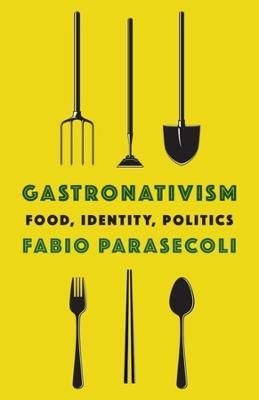Gastronativism: Food, Identity, Politics

Gastronativism: Food, Identity, Politics
The Italian political right is outraged by halal tortellini and a pork-free lasagna served at the Vatican. In India, Hindu fundamentalists organize attacks on Muslims who sell beef. European anti-immigrant politicians denounce couscous and kebabs. In an era of nationalist and exclusionary movements, food has become a potent symbol of identity. Why has eating become so politically charged-and can the emotions surrounding food be redirected in a healthier direction?
Fabio Parasecoli identifies and defines the phenomenon of "gastronativism," the ideological use of food to advance ideas about who belongs to a community and who does not. As globalization and neoliberalism have transformed food systems, people have responded by seeking to return to their roots. Many have embraced local ingredients and notions of cultural heritage, but this impulse can play into the hands of nationalist and xenophobic political projects. Such movements draw on the strong emotions connected with eating to stoke resentment and contempt for other people and cultures.
Parasecoli emphasizes that gastronativism is a worldwide phenomenon, even as it often purports to oppose local aspects and consequences of globalization. He also explores how to channel pride in culinary traditions toward resisting transnational corporations, uplifting marginalized and oppressed groups, and assisting people left behind by globalization. Featuring a wide array of examples from all over the world, Gastronativism is a timely, incisive, and lively analysis of how and why food has become a powerful political tool.
Winner, Gourmand World Cookbook Awards - Food - Food Heritage - USA Nominee, Book Award in Food Issues and Advocacy, James Beard Foundation The Italian political right is outraged by halal tortellini and a pork-free lasagna served at the Vatican. In India, Hindu fundamentalists organize attacks on Muslims who sell beef. European anti-immigrant politicians denounce couscous and kebabs. In an era of nationalist and exclusionary movements, food has become a potent symbol of identity. Why has eating become so politically charged--and can the emotions surrounding food be redirected in a healthier direction? Fabio Parasecoli identifies and defines the phenomenon of "gastronativism," the ideological use of food to advance ideas about who belongs to a community and who does not. As globalization and neoliberalism have transformed food systems, people have responded by seeking to return to
PRP: 163.20 Lei
Acesta este Prețul Recomandat de Producător. Prețul de vânzare al produsului este afișat mai jos.
146.88Lei
146.88Lei
163.20 LeiLivrare in 2-4 saptamani
Descrierea produsului
The Italian political right is outraged by halal tortellini and a pork-free lasagna served at the Vatican. In India, Hindu fundamentalists organize attacks on Muslims who sell beef. European anti-immigrant politicians denounce couscous and kebabs. In an era of nationalist and exclusionary movements, food has become a potent symbol of identity. Why has eating become so politically charged-and can the emotions surrounding food be redirected in a healthier direction?
Fabio Parasecoli identifies and defines the phenomenon of "gastronativism," the ideological use of food to advance ideas about who belongs to a community and who does not. As globalization and neoliberalism have transformed food systems, people have responded by seeking to return to their roots. Many have embraced local ingredients and notions of cultural heritage, but this impulse can play into the hands of nationalist and xenophobic political projects. Such movements draw on the strong emotions connected with eating to stoke resentment and contempt for other people and cultures.
Parasecoli emphasizes that gastronativism is a worldwide phenomenon, even as it often purports to oppose local aspects and consequences of globalization. He also explores how to channel pride in culinary traditions toward resisting transnational corporations, uplifting marginalized and oppressed groups, and assisting people left behind by globalization. Featuring a wide array of examples from all over the world, Gastronativism is a timely, incisive, and lively analysis of how and why food has become a powerful political tool.
Winner, Gourmand World Cookbook Awards - Food - Food Heritage - USA Nominee, Book Award in Food Issues and Advocacy, James Beard Foundation The Italian political right is outraged by halal tortellini and a pork-free lasagna served at the Vatican. In India, Hindu fundamentalists organize attacks on Muslims who sell beef. European anti-immigrant politicians denounce couscous and kebabs. In an era of nationalist and exclusionary movements, food has become a potent symbol of identity. Why has eating become so politically charged--and can the emotions surrounding food be redirected in a healthier direction? Fabio Parasecoli identifies and defines the phenomenon of "gastronativism," the ideological use of food to advance ideas about who belongs to a community and who does not. As globalization and neoliberalism have transformed food systems, people have responded by seeking to return to
Detaliile produsului










